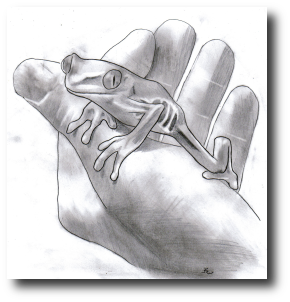Amanda YskampNovember 2008 The Scientific Method If this was my final examination, I have to admit I failed. I did nothing but watch, paralyzed, stricken, more estranged than ever.
The Colegio de Caribe was established for the foreign executives of Dole banana in Costa Rica to have a school for their kids, insulated from the locals. By the time my sister, Lisë, and I joined the staff, it served the spoiled scions of the town’s doctors, lawyers, and business class. Perched on a coral ridge overlooking the Caribbean, the whitewashed cinderblock classrooms echoed with rote and recitation, the straining voices of adolescence. I was hired to teach science in English. It had been a tough year for me; I’d grown to feel more and more foreign, alienated, as if I was being subjected to a kind of experiment myself. In the finals week, I had a free period during Maestro Guillermo’s presentations, so I stood at the window to watch. What I saw repulsed me beyond anything I’d seen that whole year. Maestro Guillermo, my Tico counterpart, had offered his students free choice in the final experiment they could perform. Three of the boys, my 7th graders, had rigged a little cage of 12-penny nails with a mesh top. This was to keep a little frog entrapped. The whole thing was wired, attached to a voltaic cell. I can’t imagine what the experiment was intended to prove, the hipótesis, the pregunta comprobable. How much electricity can a helpless amphibian bear before it dies? What does a tortured creature look like? Does it make a sound? If so, what kind? At what point will an observing outsider intervene, if at all? Placed inside, the frog’s legs coiled, sprung, coiled, sprung, as if, with enough repetitions, the reflex would achieve freedom. For the life of this organism so far, a leap had always worked. Then the boys flipped the switch and the intensity of the frog’s movements gathered into panic. It jumped and jumped, the helpless instinct for living, jerking against the nails. Its desperation rose in a crescendo, then with falling energy, like the well-wrought story, finally subsided in death. The whole class shouted through the stages of the animal’s last dance, but mirrored, reversed, louder with the final throes, triumphant at its defeat. If this was my final examination, I have to admit I failed. I did nothing but watch, paralyzed, stricken, more estranged than ever. Was this a cruelty native to this country? A feature of youth? Was there an inherent hierarchy in species that allowed “lower” animals to suffer for whatever project humans could devise? Looking at the assembled spectacle, I began to wonder if I shared essential human responses with these people. It was an appalling thought, but maybe I had become closer kin to other phyla, orders, genera. I did and said nothing. I was too stunned and maybe I questioned how I could speak up against what might be something nationally entrenched, I, a not completely welcome visitor to this foreign country. I can still see their faces, of my students, rapt, even exultant, of Guillermo, not, as I would have imagined — pained but tolerant — no, he looked bemused, almost proud. How inventive of his students to engineer such an elaborate appliance. And this was their final experiment, but what was the variable, the control, the conclusion? How did observations bear out the query? Who was the subject, the object, the wizard? They say a frog placed in a pot of water and set upon a flame will adapt to each new increment of heat until boiled dead white. That’s a different experiment. I know I’m not that kind of frog. I left the school after my first year. Tip the AuthorIf you liked this, tip the author! We split donations, with 60% going to the author and 40% to us to keep the flashes coming. (For Classic Flashes, it all goes to support Flash Fiction Online.) Payments are through PayPal, and you can use a credit card or your PayPal account. About the AuthorAmanda Yskamp Poet and fiction writer Amanda Yskamp’s work has appeared widely in such magazines as Threepenny Review, Hunger Mountain, caketrain, Redivider, and The Georgia Review. She lives with poet Doug Larsen and their two children on the 10-year flood plain of the Russian River, where she teaches correspondence courses and writes for the local newspaper. Your Commentscomments powered by DisqusCopyrightCopyright © 2008, Amanda Yskamp. All Rights Reserved. |

